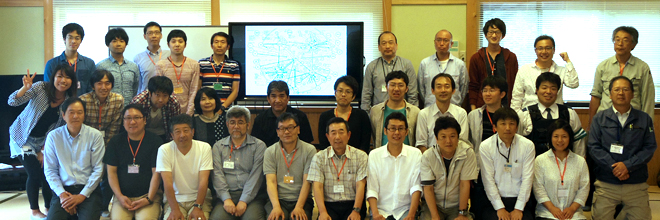Recent major efforts Environment CSR business training based on the theme of "businesses utilizing ICT that fulfil both social contribution and economics"


By utilizing its optical network services, NTT West Group "connects and designs" everything under the sun, including the connection between people, people and things, and between things. By doing so, we aim to contribute to the creation of new cultures that will enrich people’s lives, as well as the invigoration of local economies and revitalization of local communities and towns.
If depopulation can be prevented by revitalizing local communities and towns in a sustainable way, this will also help to conserve the nature and ecosystem of satoyama (village forests) that are maintained by the surrounding people.
Against this backdrop, we have been holding "Environment CSR Business Trainings" since the previous fiscal year with the support of the government, NPOs and local communities to examine how issues faced by the local communities can be resolved in a way that is also economically sustainable.
In this fiscal year, the training was held on May 14-15, 2015 at the Omiya-Minami area in Omiya-cho, Kyotango City of Kyoto Prefecture.
At the training, Mr. Kazuma Higashida of Tsuneyoshi Department Store gave a talk on how to establish business in a rural village, and participants learned the mechanism of cutting cost by utilizing the "connection (cooperative relationship)" that characterizes a village where each and every resident knows the rest of the community in person. Some examples include having elderly farmers contribute the surplus vegetables they produced (to reduce cost of purchase), publicity through word-of-mouth (to reduce publicity cost) and having the uncle who always comes to the store at the same time each day for a short rest to look after the store while the staff goes out for delivery (to redact labor cost).
Also, in the talk by Mr. Sadayoshi Hishikawa, director of NPO Inochi no Sato Kyotomura, participants learned that the key to successfully building a sustainable business in a village is to leverage the cooperative relationship in the economic activities. He also taught the participants the way to create a "Tsunagari (Connection) Map" for visualizing the current cooperative relationship between people and between people and activities.
At the workshop that was held after the talks, participants were divided into groups to interact with the local community and visualize the cooperative relationship of the community based on the scenario that they were "I-turn" residents who moved to this village from another local region to work at places such as a police substation, school and nursing home.
At the end of the interaction, participants were asked to think of a new and realistic cooperative relationship, and to discuss and present in groups a sustainable business model that is established based on such a cooperative relationship.
At the training, the participants learned that simply introducing an urban-focused business model does not provide a realistic solution to the local community; it would be meaningless unless a sustainable business model is considered for a local economy; and a sustainable model can be created with business that makes effective use of the cooperative relationships. At the same time, participants also learned the importance of regional and social contributions that can be realized through communications and ICT, such as the significance and vital role of communications in "connections with people" since businesses require appropriate "connections with people," and also the ability of communications and ICT to spread "joy."
We would hereby like to extend our gratitude to the people of the Omiya-Minami area for the warm welcome and also to members of the planning team who have provided tremendous support in the planning and operation of this training session.
[Training Planning]
Omiya-Minami Area Satoryoku Revitalization Council
Challenge Tsuneyoshi Department Store Executive Committee
NPO Inochi no Sato Kyotomura
Agriculture Promotion Section, Department of Agriculture, Forestry and Fisheries, Kyoto Prefecture
Environment Management Promotion Office, NTT West
Laboratory of Sustainable Rural Development, Graduate School of Global Environmental Studies, Kyoto University
[Supported by]
Tsuneyoshi Substation of Kyotango City Police Station, Kyotango City Omiya-Minami Elementary School, Akebono-so (Social Welfare Corporation Fudoen), Shizen-Kobo Aoki, Kyotango City Agricultural Administration Section, residents of Omiya-Minami district


